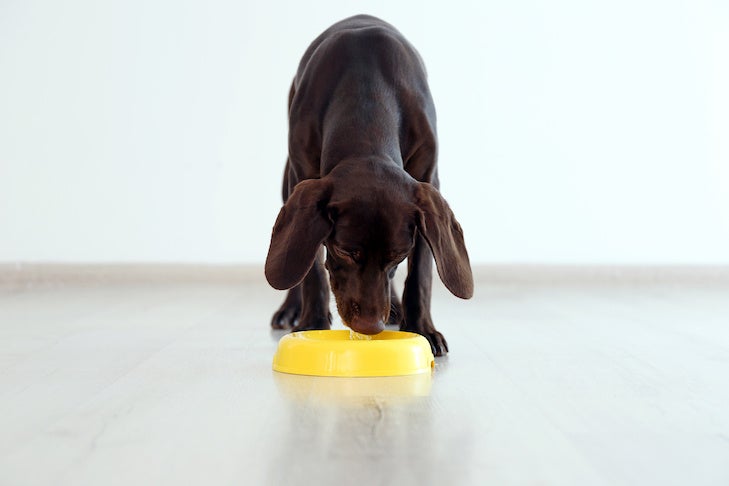Who can resist the pleading eyes of our furry friends on a scorching summer day? As you indulge in a refreshing frozen treat, you may wonder if you can share the joy with your beloved dog. While it may be tempting to give them a taste of your ice cream, frozen yogurt, or popsicles, it’s important to consider their well-being. In this article, we’ll explore whether dogs can safely enjoy these icy delights and discuss some vet-approved alternatives that will keep their tails wagging.
Reasons to Avoid Feeding Dogs Ice Cream
Dairy products are known to be a common source of food intolerances for dogs. Some may experience vomiting, diarrhea, or abdominal discomfort after consuming dairy. If you decide to offer your dog a small amount of ice cream, it’s crucial to observe their reaction and proceed with caution. However, it’s important to note that certain ingredients commonly found in frozen treats can pose serious health risks to dogs.
Chocolate and macadamia nuts, for example, are toxic to dogs. To ensure their safety, stick to plain vanilla or fruit flavors. Dogs, just like humans, require a balanced diet and proper weight management for optimal health. Excessive consumption of sugary treats, such as ice cream and other sweet delights, can lead to weight gain and dental issues.
It’s also important to be aware of the presence of xylitol in frozen treats. This artificial sweetener is highly toxic and potentially lethal for dogs, especially smaller breeds. Always check the ingredients list for any harmful additives before offering ice cream to your furry friend. Additionally, popsicle sticks can pose a choking hazard or cause splintering, leading to intestinal dangers.
Fortunately, there are still plenty of ways to spoil your dog on a hot day with frozen treats that are veterinarian-approved and tailored to their needs.
DIY Dog-Friendly Frozen Treats
While dairy is generally not recommended for dogs, fresh plain yogurt with good bacteria can be more tolerable for them. If you prefer to avoid dairy altogether, you can substitute it with coconut milk (ensuring it doesn’t contain xylitol or other harmful ingredients).
For a quick frozen treat, try frozen green beans or small chunks of dog-safe fruits such as blueberries, bananas, strawberries, or peaches. If you opt for store-bought frozen items, make sure there are no added seasonings or preservatives by carefully reading the labels.
Here are some simple and tasty frozen treat ideas you can make at home:
- Combine ripe banana, pumpkin, or sweet potato with plain yogurt or coconut milk. Freeze the mixture in a mold or ice cube tray.
- Use a blender or food processor to puree watermelon, cantaloupe, or honeydew. Pour the puree into ice cube trays or silicone molds and freeze.
- Create “ice cream” by mixing pureed melon with frozen yogurt or coconut milk. Freeze the mixture in a freezer-safe bowl.
- Fill an ice cube tray with pureed bananas and top each slot with a dollop of freshly-ground peanut butter. Freeze for a delicious and safe treat.
You can also get creative by combining grilled chicken, yogurt (or chicken broth), and cooked carrots in a food processor, and then freezing the mixture. Alternatively, fill your dog’s favorite chew toy with one of the above recipes and freeze it for extended chew time.
Remember, along with these fun frozen treats, it’s important to provide your dog with plenty of activity and fresh, clean water to stay hydrated during the summer months.
Frequently Asked Questions
Q: Can dogs safely eat Italian ice?
A: Dogs should avoid consuming Italian ice or any frozen treats that may contain harmful ingredients or artificial sweeteners like xylitol. Stick to vet-approved frozen treats or homemade alternatives.
Q: What are the risks of feeding dogs ice cream?
A: Ice cream can lead to food intolerances, weight gain, dental issues, and potential toxicity from ingredients like chocolate and macadamia nuts. Additionally, popsicle sticks pose a choking hazard and splintering dangers.
Q: Can dogs have dairy products?
A: While some dogs can tolerate small amounts of dairy, it’s best to seek alternatives to avoid digestive issues. Fresh plain yogurt with good bacteria or coconut milk can be safer options.
Conclusion
Hot summer days can be made even more enjoyable when we can share frozen treats with our furry companions. However, it’s essential to prioritize their health and safety when indulging them. While ice cream, frozen yogurt, and popsicles may not be suitable for regular consumption, there are numerous dog-friendly alternatives you can make at home. Remember to consider your dog’s specific dietary needs and preferences. Treat them with love and care, and together you can beat the heat in the most delightful way.
For more information and pet-friendly resources, visit Pawsoha.
